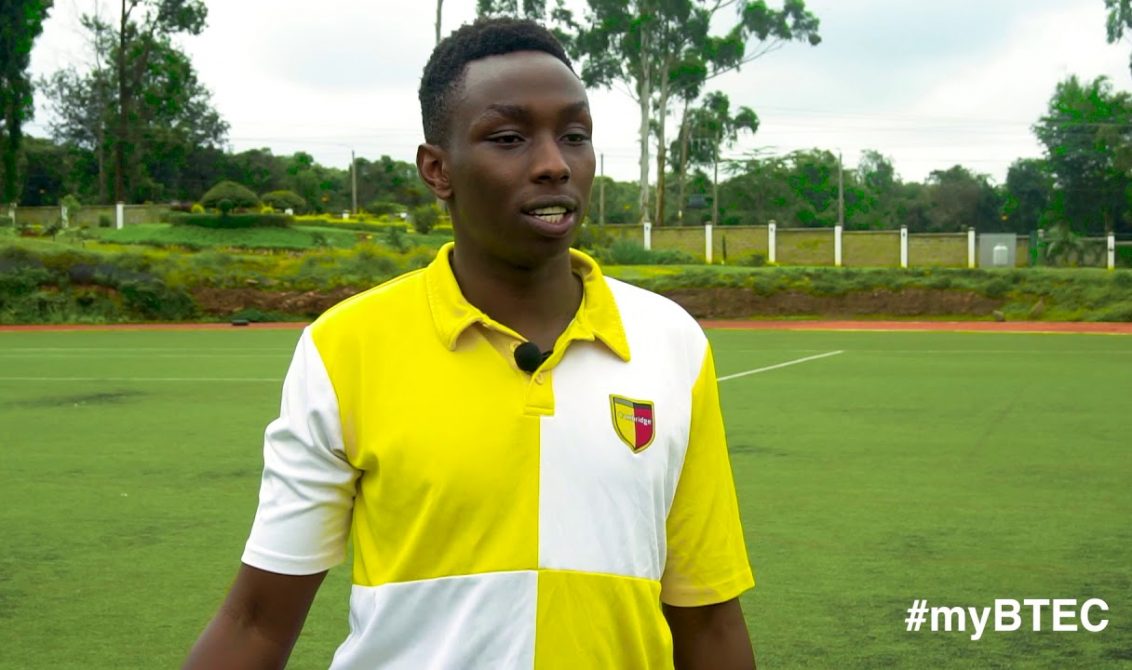
The story of how I got to know Kodeck Mose, Head of BTEC Programmes and Examinations Officer at GEMS Cambridge International School in Nairobi, started with his students. As I was idly browsing my Facebook feed, my finger paused and hovered over a video featuring students talking with passion about what they were learning – not “about”, but “to do”. The videos were part of #myBTEC campaign from the GEMS schools in Nairobi, telling the prospective students and parents about the option of taking a BTEC qualification.
With Kodeck at the helm, the programme grew from 6-7 students to close to 70 enrolments. He developed a training programme for staff, links with contacts in the UK and Kenya, as well as partnerships with universities. He is often consulted by other schools who want to successfully implement the programme.
The beginnings
After completing his first degree in education, Kodeck went to the UK to do a Masters and gain work experience within the UK school system. Some of the schools he worked in also offered BTEC qualifications. “That’s how my interest in BTEC first developed. I had a chance to learn how the qualifications work.”
“I came back to Kenya and in 2014 I started to work for GEMS Cambridge International School, which had opened 2 years earlier in Nairobi. The idea of BTEC was discussed, but it didn’t have a champion, and I had a great opportunity to build the programme.”
BTEC qualifications are a perfect expression of the school ethos: “At GEMS Cambridge International School – Nairobi we believe in a well-rounded education that ensures every individual student thrives and discovers their own strengths and abilities, whatever their passion or talents. In addition, students and parents choose us because of our emphasis on innovation and being able to produce students who are global citizens.”
“BTEC programmes are growing in Kenya and the rest of East Africa. People are beginning to realise that education has more paths than just academic exams.“
Giving students choice and options
“It is now widely acknowledged that the job market is changing rapidly and whilst knowledge is important, enterprising skills such as adaptability, creative thinking and decision making are highly sought after. At GEMS Cambridge International School, Nairobi we have made these qualifications available to help our students to acquire knowledge, skills and understanding through practical and work-related activities in real life contexts. We also started BTEC qualifications to provide students with alternative pathways that would ensure their progression to further studies and promote active learning in various vocational contexts that, in turn, build students’ confidence, competence and motivation.”
“I have seen a great impact in BTEC graduates after completing their qualifications. These graduates show great attitude towards life issues and problem solving, confidence in their presentations, motivation to try things unknown to them, open-mindedness, strong research skills, adaptability to change, global citizenship. They turn into independent inquirers who are always ready to discover the underlying issues.”
What helped make BTEC such a success in your school?
“Most importantly, I had support from the students; they are so passionate about what they do. BTEC provides an alternative pathway away from exams. That is something parents are often sceptical about. They want their children to progress to university and then have great careers, so building their confidence in the programme was crucial. Strong links with universities and showing students clear paths for progression helps with that. For example, we have a partnership with a university in Switzerland, whereby out BTEC students from our schools are directly admitted to courses. The university representatives came to inspect the school and assess the quality of teaching, and now our hospitality and international business students have this great opportunity.”
His most heart-warming BTEC story is of one of 2017 BTEC graduates. “The student who had very good grades in his IGCSEs then did AS exams and failed terribly. This student walked to my office with a frustrated face and said ‘I have given up’. I worked hard to convince him that he still had a chance to fulfil his career dreams. I managed to encourage him to enrol for BTEC and he worked so hard! He came up with a business idea in the course of his BTEC journey that won in our international schools’ entrepreneurship competition. Today, that student is at one of the top African Business Universities pursuing his dream career. BTEC allows students to re-discover themselves and transform their future life.”
What’s your advice to schools considering whether to offer BTEC to their students?
One: before you start the programmes, you need to know the students' needs. Just like in business: when you understand the “customers”, you can identify the gaps in your curriculum and choose subjects and qualifications that will give students greater choice.
Two: ask yourself honestly: do you have the resources and capacity to deliver the programme well?
Three: make sure you fully understand the requirements, and can you fulfil them to the letter? Otherwise, you risk your BTEC being weak. There is this misconception, that if there are no exams, you can take it not as seriously. Thinking that way is a huge mistake.
Four: identify proper progression pathways for the students. What can they do after the finish their programme? Otherwise it’s hard for the students – and their parents – to imagine the future.
Find out more about the range of BTEC qualifications.

